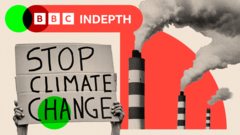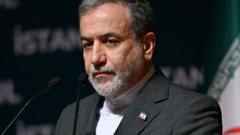With Donald Trump's expected re-entry into office and his stated intent to withdraw from COP climate talks, China signals a shift in climate negotiations. China's newfound cooperative stance contrasts with its historical role, potentially positioning it as a key player as the U.S. retreats.
Climate Talks Shift: China's Rise as the U.S. Withdraws

Climate Talks Shift: China's Rise as the U.S. Withdraws
As the political landscape changes with the potential withdrawal of the U.S. from climate negotiations under President Trump, China may be stepping up to take a leading role in the COP process.
As climate negotiations unfold against the backdrop of significant political changes, the dynamics of COP talks are poised for a substantial transformation. The recent COP climate summit showcased tensions among negotiating teams and concerns about the effectiveness of the process. Amidst these challenges, a notable figure from one of the prominent delegations expressed frustration about what they termed the “worst COP ever,” highlighting ongoing discord and stalled agreements.
The imminent presidency of Donald Trump raises questions about the future of U.S. involvement in these essential negotiations. Trump has previously dismissed climate action as a “scam” and signaled intentions to ramp up U.S. oil production. However, in contrast to the U.S.’s anticipated withdrawal, China appears to be taking steps towards a more proactive role in climate discussions.
China's approach at this year's COP has been described as unusually cooperative. Historically, China's participation has been inconsistent; at times, it aligned with Western nations to advocate for ambitious climate targets while also acting as a roadblock on critical issues. Notable was its resistance during COP15 in Copenhagen, where negotiations nearly fell apart due to concerns about U.S. monitoring expectations. This conference, however, saw China publicly disclose its climate finance commitments, announcing over $24 billion in support of climate initiatives in developing nations since 2016. This marked a notable shift in behavior that has stirred discussions among negotiators.
Despite being classified as a developing country under UN climate talks, China has grown into a global economic heavyweight. The binding nature of this classification has allowed it to avoid making the same level of financial contributions as wealthier nations to assist poorer countries. The urgency of climate finance is underscored by a stark contrast: while developed nations have pledged to pool $100 billion annually, the estimated funding required by developing countries stands at over a trillion dollars for climate adaptation and renewable energy deployment.
As China increases its financial flows towards developing nations, it aims to capitalize on the emerging markets within the renewable energy sector. With its dominance in solar panel and wind turbine production, along with significant strides in electric vehicle manufacturing, China stands at the forefront of renewable technology. The private sector is pushing this evolution, highlighting the importance of securing new markets—especially in developing regions that will drive future demand for clean energy solutions. In tandem with Beijing's “Belt and Road Initiative,” which aims to forge new economic connections, China’s investments in clean technologies are set to grow.
Analysts believe that this shift in climate discourse towards economic factors rather than solely political debate may redefine the future of global climate negotiations. If China consolidates its position as a leader, it could mean a significant change in how COP conversations progress, reflective of a broader movement driven by renewable energy economics rather than traditional political maneuvers.
The potential absence of U.S. leadership may prompt the conference to operate differently, as experts propose that China might engage in negotiations more discreetly, preferably seeking to mediate when disputes arise. However, this may lead to challenges, particularly with nations resistant to fast-tracking the transition away from fossil fuels—an area where China's past support has faltered.
The emerging narrative emphasizes the desire for urgent financial interventions over political rhetoric. As various countries analyze their positions ahead of meetings, the stakes are high. Regardless of whether global superpowers decide to take lead roles in the climate narrative or withdraw, the compelling need for investment in sustainable technologies signifies a pivotal moment in the history of climate negotiations.



















